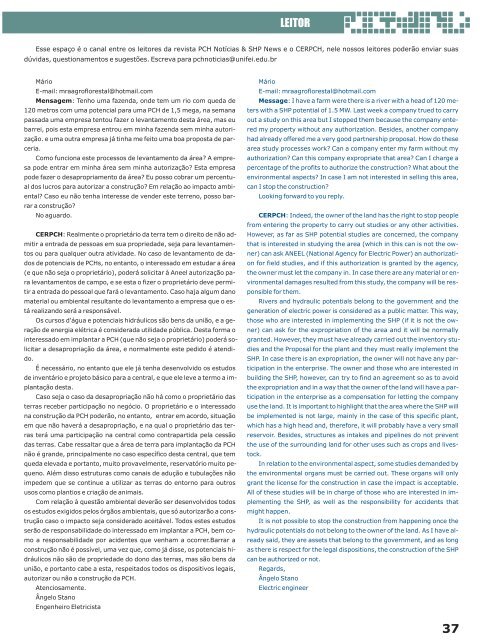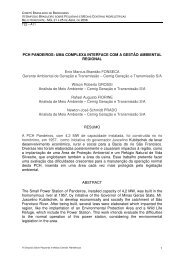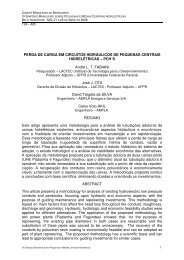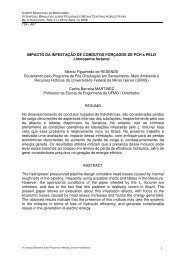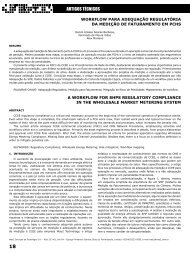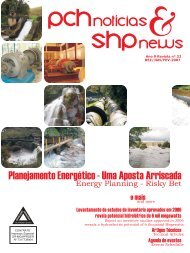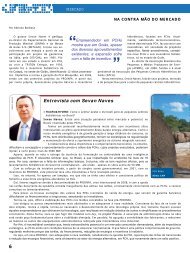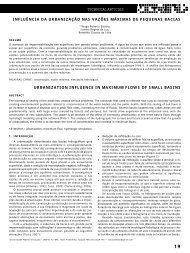03 - CERPCH - Unifei
03 - CERPCH - Unifei
03 - CERPCH - Unifei
You also want an ePaper? Increase the reach of your titles
YUMPU automatically turns print PDFs into web optimized ePapers that Google loves.
Mário<br />
E-mail: mraagroflorestal@hotmail.com<br />
Mensagem:<br />
Tenho uma fazenda, onde tem um rio com queda de<br />
120 metros com uma potencial para uma PCH de 1,5 mega, na semana<br />
passada uma empresa tentou fazer o levantamento desta área, mas eu<br />
barrei, pois esta empresa entrou em minha fazenda sem minha autorização.<br />
e uma outra empresa já tinha me feito uma boa proposta de parceria.<br />
Como funciona este processos de levantamento da área? A empresa<br />
pode entrar em minha área sem minha autorização? Esta empresa<br />
pode fazer o desapropriamento da área? Eu posso cobrar um percentual<br />
dos lucros para autorizar a construção? Em relação ao impacto ambiental?<br />
Caso eu não tenha interesse de vender este terreno, posso barrar<br />
a construção?<br />
No aguardo.<br />
<strong>CERPCH</strong>:<br />
Realmente o proprietário da terra tem o direito de não admitir<br />
a entrada de pessoas em sua propriedade, seja para levantamentos<br />
ou para qualquer outra atividade. No caso de levantamento de dados<br />
de potenciais de PCHs, no entanto, o interessado em estudar a área<br />
(e que não seja o proprietário), poderá solicitar à Aneel autorização para<br />
levantamentos de campo, e se esta o fizer o proprietário deve permitir<br />
a entrada do pessoal que fará o levantamento. Caso haja algum dano<br />
material ou ambiental resultante do levantamento a empresa que o está<br />
realizando será a responsável.<br />
Os cursos d'água e potenciais hidráulicos são bens da união, e a geração<br />
de energia elétrica é considerada utilidade pública. Desta forma o<br />
interessado em implantar a PCH (que não seja o proprietário) poderá solicitar<br />
a desapropriação da área, e normalmente este pedido é atendido.<br />
É necessário, no entanto que ele já tenha desenvolvido os estudos<br />
de inventário e projeto básico para a central, e que ele leve a termo a implantação<br />
desta.<br />
Caso seja o caso da desapropriação não há como o proprietário das<br />
terras receber participação no negócio. O proprietário e o interessado<br />
na construção da PCH poderão, no entanto, entrar em acordo, situação<br />
em que não haverá a desapropriação, e na qual o proprietário das terras<br />
terá uma participação na central como contrapartida pela cessão<br />
das terras. Cabe ressaltar que a área de terra para implantação da PCH<br />
não é grande, principalmente no caso específico desta central, que tem<br />
queda elevada e portanto, muito provavelmente, reservatório muito pequeno.<br />
Além disso estruturas como canais de adução e tubulações não<br />
impedem que se continue a utilizar as terras do entorno para outros<br />
usos como plantios e criação de animais.<br />
Com relação à questão ambiental deverão ser desenvolvidos todos<br />
os estudos exigidos pelos órgãos ambientais, que só autorizarão a construção<br />
caso o impacto seja considerado aceitável. Todos estes estudos<br />
serão de responsabilidade do interessado em implantar a PCH, bem como<br />
a responsabilidade por acidentes que venham a ocorrer.Barrar a<br />
construção não é possível, uma vez que, como já disse, os potenciais hidráulicos<br />
não são de propriedade do dono das terras, mas são bens da<br />
união, e portanto cabe a esta, respeitados todos os dispositivos legais,<br />
autorizar ou não a construção da PCH.<br />
Atenciosamente.<br />
Ângelo Stano<br />
Engenheiro Eletricista<br />
LEITOR<br />
Esse espaço é o canal entre os leitores da revista PCH Notícias & SHP News e o <strong>CERPCH</strong>, nele nossos leitores poderão enviar suas<br />
dúvidas, questionamentos e sugestões. Escreva para pchnoticias@unifei.edu.br<br />
Mário<br />
E-mail: mraagroflorestal@hotmail.com<br />
Message:<br />
I have a farm were there is a river with a head of 120 meters<br />
with a SHP potential of 1.5 MW. Last week a company trued to carry<br />
out a study on this area but I stopped them because the company entered<br />
my property without any authorization. Besides, another company<br />
had already offered me a very good partnership proposal. How do these<br />
area study processes work? Can a company enter my farm without my<br />
authorization? Can this company expropriate that area? Can I charge a<br />
percentage of the profits to authorize the construction? What about the<br />
environmental aspects? In case I am not interested in selling this area,<br />
can I stop the construction?<br />
Looking forward to you reply.<br />
<strong>CERPCH</strong>:<br />
Indeed, the owner of the land has the right to stop people<br />
from entering the property to carry out studies or any other activities.<br />
However, as far as SHP potential studies are concerned, the company<br />
that is interested in studying the area (which in this can is not the owner)<br />
can ask ANEEL (National Agency for Electric Power) an authorization<br />
for field studies, and if this authorization is granted by the agency,<br />
the owner must let the company in. In case there are any material or environmental<br />
damages resulted from this study, the company will be responsible<br />
for them.<br />
Rivers and hydraulic potentials belong to the government and the<br />
generation of electric power is considered as a public matter. This way,<br />
those who are interested in implementing the SHP (if it is not the owner)<br />
can ask for the expropriation of the area and it will be normally<br />
granted. However, they must have already carried out the inventory studies<br />
and the Proposal for the plant and they must really implement the<br />
SHP. In case there is an expropriation, the owner will not have any participation<br />
in the enterprise. The owner and those who are interested in<br />
building the SHP, however, can try to find an agreement so as to avoid<br />
the expropriation and in a way that the owner of the land will have a participation<br />
in the enterprise as a compensation for letting the company<br />
use the land. It is important to highlight that the area where the SHP will<br />
be implemented is not large, mainly in the case of this specific plant,<br />
which has a high head and, therefore, it will probably have a very small<br />
reservoir. Besides, structures as intakes and pipelines do not prevent<br />
the use of the surrounding land for other uses such as crops and livestock.<br />
In relation to the environmental aspect, some studies demanded by<br />
the environmental organs must be carried out. These organs will only<br />
grant the license for the construction in case the impact is acceptable.<br />
All of these studies will be in charge of those who are interested in implementing<br />
the SHP, as well as the responsibility for accidents that<br />
might happen.<br />
It is not possible to stop the construction from happening once the<br />
hydraulic potentials do not belong to the owner of the land. As I have already<br />
said, they are assets that belong to the government, and as long<br />
as there is respect for the legal dispositions, the construction of the SHP<br />
can be authorized or not.<br />
Regards,<br />
Ângelo Stano<br />
Electric engineer<br />
37


